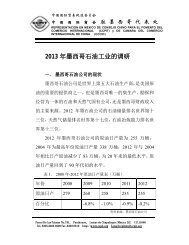You also want an ePaper? Increase the reach of your titles
YUMPU automatically turns print PDFs into web optimized ePapers that Google loves.
LATIN AMERICA<br />
Meanwhile, Chinese companies aren’t the<br />
only newcomers to the race in Brazil. Facebook,<br />
which didn’t have operations here until the last<br />
couple of years, saw its Brazilian visitor numbers<br />
grow 41% to 43.3 million a month in September<br />
2012, with average time spent on the site growing<br />
208%, according to comScore. That made the<br />
country one of Facebook’s fastest-growing markets.<br />
Meanwhile, the number of users on Google’s Orkut<br />
social-networking site in Brazil over the year<br />
leading up to September dropped 55%, while time<br />
spent on the site fell 83%. ComScore says that collectively<br />
Google sites are the most popular in Brazil,<br />
but the average time spent on them has shrunk<br />
45% over that period.<br />
South Korea’s Samsung Electronics also has<br />
made an aggressive push in the Brazil market, including<br />
undercutting competitors’ prices, and it has<br />
already become one of the top PC vendors and the<br />
top smartphone vendor in the country.<br />
Apple, though an important player in the market,<br />
doesn’t enjoy the kind of market share in Brazil<br />
that it has elsewhere. Its products are priced at a premium<br />
here and it has yet to open a Brazilian Apple<br />
Store, relying instead on a network of resellers and<br />
mobile carriers.<br />
Attempt to copy the success at home<br />
Chinese companies hope to replicate the success<br />
they have had in their home market by giving<br />
their products and sites a local flavor. Baidu gained<br />
an edge over Google in China in part by tailoring<br />
its services to adapt to quirks in the market, such as<br />
making its search bar bigger to accommodate Chinese<br />
characters more easily.<br />
The company launched its Hao123 home-page<br />
service for Brazilian users this year. It provides links<br />
to popular websites that are designed to make navigation<br />
easier for new Internet users. It also plans to<br />
launch a full-service search engine to compete with<br />
Google and has assigned hundreds of engineers to<br />
the effort.<br />
For Lenovo, establishing operations in Brazil<br />
means the firm will assemble, design and source<br />
more of its product parts locally. That will help reduce<br />
its taxes and enable it to compete better with<br />
local PC vendors, such as market leader Positivo<br />
Informatica on price. Lenovo has 4,000 employees<br />
in Brazil. It has just completed the acquisition of local<br />
electronics brand CCE for 300 million Brazilian<br />
reals ($146.5 million) and is already building a $30<br />
million plant.<br />
Lenovo hopes the acquisition of CCE, a lowerend<br />
brand, and being more competitive on prices<br />
will boost its business in fast-growing, less wealthy<br />
regions of the country.<br />
Brazil is like a “blank slate” because competitors<br />
“may not see the Brazil opportunity as big enough to<br />
go through the trouble of such fundamental changes,”<br />
says Dan Stone, head of Lenovo’s Brazil business.<br />
From acquisitions to new manufacturing and<br />
research facilities, “we are making more investments<br />
in Brazil than in any country outside of China.”<br />
Meanwhile, Tencent, the operator of QQ , the<br />
most popular instant-messaging service in China,<br />
has launched a Portuguese version of its growing<br />
private-messaging mobile application Weixin, called<br />
WeChat in English. Right now, San Franciscobased<br />
WhatsApp is the most popular smartphone<br />
private-messaging service in Brazil.<br />
69

















